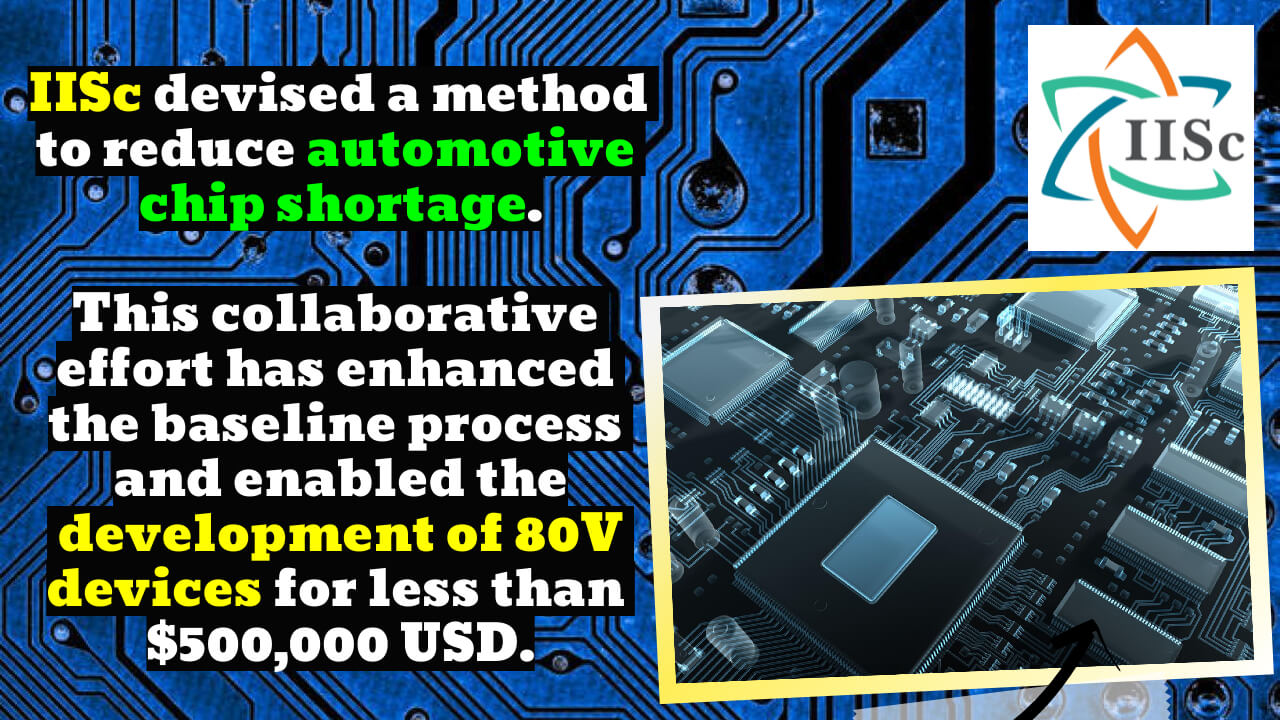Under the IMPRINT program of the Indian government, researchers from the Indian Institute of Science (IISc) have been partnering with a semiconductor foundry. This, they suggest, might help alleviate the car industry’s severe chip shortage.
Silicon LDMOS devices are a class of field-effect transistors that operate at significantly greater voltages than conventional transistors. Additionally, they may be merged with billions of other transistors on a single chip, making them perfect for automobile and space applications.
Key Highlight:
- The Indian Institute of Science (IISc) has been working with a semiconductor foundry under the IMPRINT program of the Indian government to address a severe chip shortage in the car industry.
- Silicon LDMOS devices are high-voltage field-effect transistors.
- A variety of LDMOS devices (10V to 80V) with characteristics matching current industry offerings has been developed by the IISc team and its foundry partner.
- The result of the collaboration is a robust high voltage automotive technology platform.
- This collaborative effort has augmented the baseline procedure and enabled the development of 80V devices for less than $500,000.
- “IISc and its partners worked pretty much like an industrial R&D team and approached the core difficulties differently,” says project leader Prof Mayank Shrivastava (Department of Electronic Systems Engineering).
Researchers from the Indian Institute of Science (IISc) have been collaborating with a semiconductor foundry under the Government of India’s IMPRINT program to solve the automobile industry’s severe chip shortage.
On Friday, the IISc team began work on building an indigenous technology platform for manufacturing automotive (analog) chips for commercial and strategic purposes.
Since early 2021, the automotive sector has been experiencing a severe chip shortage. Numerous factors contribute to this scarcity: the growing demand for automobiles and consumer products (most of their parts are driven by electronics). As with the rest of the world, Indian vehicle makers have been greatly impacted by this shortage.
Automotive chips are distinct from the standard processor chips used in smartphones and laptops. An automobile chip (also known as a power ASIC) must perform various jobs concurrently, including instrumentation, sensing, and control of a variety of electromechanical components.
These components’ electrical interface functions at higher voltages (5V-80V) than a CPU chip, which requires a low voltage switch or transistor (0.9V-1.8V).
Developing a technology platform capable of providing the breadth of functionality required by automotive chips has always been a struggle for the industry, taking 5-6 years in comparison to the processor technology platform, which normally takes 1.5-2 years.
However, this additional time investment can pay off in terms of a substantially reduced rate of obsolescence – such chip technology can last for 15-20 years without needing to be replaced.
Automotive chips require integrated high-voltage switches or transistors. These transistors are referred to as Laterally Diffused MOS transistors (LDMOS). Silicon LDMOS devices are a form of field-effect transistor capable of operating at far greater voltages than conventional transistors. Additionally, they can be merged with billions of other transistors on a single chip. This criterion is also critical for space and defense applications.
Keeping these needs in mind, the IISc team and its foundry partner have been creating various LDMOS devices (from 10V to 80V) that match current industry products in terms of features. Collaboration has resulted in developing a highly reliable high voltage automotive technology platform.
The industry’s available technology platforms enable the development of circuits that operate at voltages ranging from 7V to 80V, greatly enhancing the previous capabilities of domestic partners operating at 3.3V. Extending this portfolio to 80V would have cost tens of millions of dollars in imported technology. This combined effort enhanced the baseline process and enabled devices running at 80V for less than 0.5 million USD.
“IISc and its partners operated like an industrial research and development team, resolving fundamental challenges empirically (through trial and error),” notes Prof Mayank Shrivastava (Department of Electronic Systems Engineering), who led the project from IISc.
“For example, we may dive more into certain fundamental concerns relating to these devices, such as their quasi-saturation behavior, which has remained a mystery for almost 40 years. We want to express our gratitude to the IMPRINT program for enabling this progress, which is proving to be a win-win situation for both IISc and its foundry partner,” he said.
Shrivastava continues by stating that the devices produced have been carefully tested and confirmed to be quite resilient. “Now that these LDMOS devices may be offered as standard offerings (as they are in other industries), they will enable our foundry partner to produce a range of VLSI products in-house. Additionally, the technology/knowledge can be shared to other semiconductor foundries interested in scaling up their process from CMOS to automotive.”





[…] The Indian Institute of Science (IISc) approach can ease automotive chip… […]